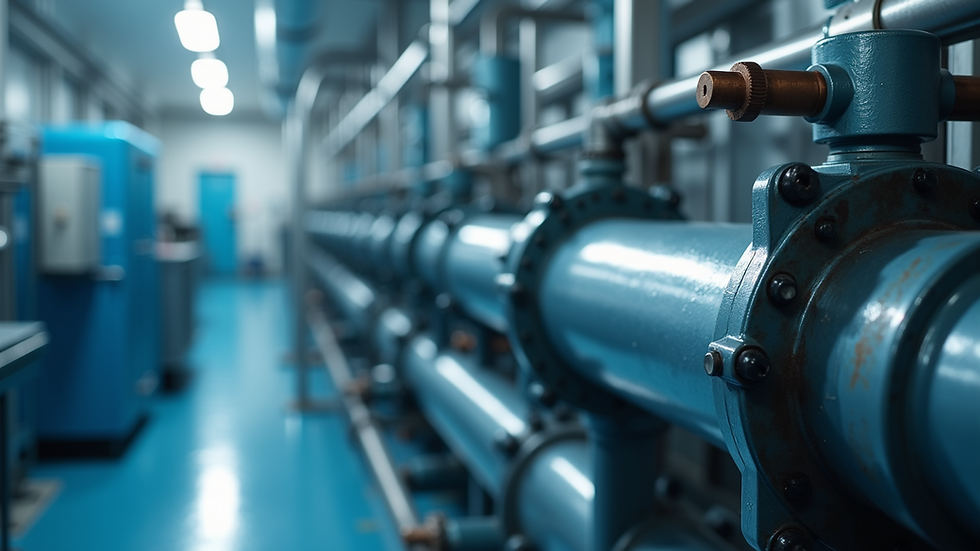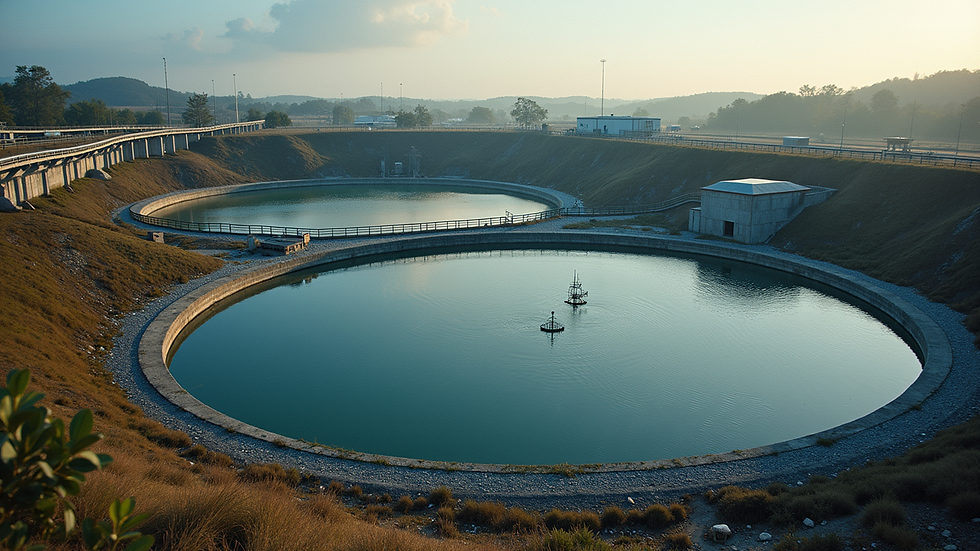Maximizing Efficiency in Industrial Water Reuse
- palwinder kaur
- Aug 28, 2025
- 5 min read
Water is a critical resource in many industrial processes. Efficient use and reuse of water can significantly reduce operational costs and environmental impact. Industrial water reuse involves treating and recycling wastewater generated during manufacturing or processing to be used again in the same or different processes. This practice not only conserves water but also helps industries comply with environmental regulations and reduce their carbon footprint.
Industries such as textiles, chemicals, food processing, and power generation consume vast amounts of water daily. By implementing effective water reuse strategies, these industries can optimize their water consumption, reduce wastewater discharge, and improve sustainability. This article explores practical ways to maximize efficiency in industrial water reuse, providing actionable insights and examples.
Understanding Industrial Water Reuse
Industrial water reuse refers to the process of treating wastewater generated from industrial activities and reusing it for various purposes within the facility. This can include cooling, cleaning, processing, or even irrigation in some cases. The quality of treated water depends on the intended reuse application, which dictates the level of treatment required.
There are several types of water reuse in industries:
Direct reuse: Treated wastewater is reused within the same process without mixing with other water sources.
Indirect reuse: Treated water is discharged into the environment and later withdrawn for use after natural purification.
Internal reuse: Water is recycled within the plant for different processes.
Benefits of Industrial Water Reuse
Cost savings: Reduces the need for fresh water intake and lowers wastewater discharge fees.
Environmental protection: Minimizes water extraction from natural sources and reduces pollution.
Regulatory compliance: Helps meet stringent discharge standards and avoid penalties.
Resource sustainability: Conserves water resources for future use.
Key Technologies for Water Reuse
Filtration systems: Remove suspended solids and particulates.
Membrane technologies: Such as reverse osmosis and ultrafiltration for removing dissolved contaminants.
Biological treatment: Uses microorganisms to degrade organic pollutants.
Chemical treatment: Includes coagulation, flocculation, and disinfection.

Strategies to Enhance Industrial Water Reuse Efficiency
Maximizing efficiency in industrial water reuse requires a combination of technology, process optimization, and management practices. Here are some effective strategies:
1. Conduct Water Audits
A comprehensive water audit helps identify water usage patterns, losses, and potential reuse opportunities. It involves measuring water inflows and outflows, analyzing wastewater characteristics, and pinpointing areas for improvement.
Actionable tips:
Map all water-consuming processes.
Identify high water use and wastewater generation points.
Quantify water losses due to leaks or evaporation.
Prioritize reuse options based on water quality and quantity.
2. Optimize Treatment Processes
Selecting the right treatment technology based on wastewater composition and reuse requirements is crucial. Combining multiple treatment methods can improve water quality and reduce operational costs.
Examples:
Using membrane bioreactors (MBR) for high-strength wastewater.
Integrating advanced oxidation processes (AOP) for removing persistent contaminants.
Employing sedimentation followed by filtration for low-cost treatment.
3. Implement Process Modifications
Adjusting industrial processes to reduce water consumption and improve wastewater quality can enhance reuse potential.
Examples:
Switching to dry or semi-dry cooling systems to reduce water use.
Using closed-loop systems to minimize water discharge.
Modifying cleaning procedures to use less water or recycle rinse water.
4. Monitor and Control Water Quality
Continuous monitoring of water quality parameters ensures that reused water meets process requirements and regulatory standards. Automated control systems can adjust treatment operations in real-time.
Key parameters to monitor:
pH levels
Total suspended solids (TSS)
Chemical oxygen demand (COD)
Biological oxygen demand (BOD)
Microbial contamination
5. Train Staff and Promote Awareness
Educating employees about the importance of water conservation and reuse encourages responsible water management practices.
Training focus areas:
Proper operation and maintenance of treatment systems.
Identifying leaks and reporting water wastage.
Understanding water reuse benefits and compliance requirements.

What do you mean by industrial waste management?
Industrial waste management involves the collection, treatment, and disposal of waste materials generated by industrial activities. This includes solid waste, hazardous waste, and wastewater. Effective waste management minimizes environmental impact, ensures worker safety, and complies with legal regulations.
In the context of water, industrial waste management focuses on treating wastewater to remove harmful substances before discharge or reuse. This requires a combination of physical, chemical, and biological treatment methods tailored to the specific waste characteristics.
Components of Industrial Waste Management
Waste minimization: Reducing waste generation at the source.
Segregation: Separating hazardous and non-hazardous waste.
Treatment: Applying appropriate technologies to neutralize or remove contaminants.
Disposal: Safe disposal methods such as landfilling, incineration, or recycling.
Importance of Industrial Waste Management
Protects water bodies from pollution.
Prevents soil contamination.
Safeguards public health.
Enhances corporate social responsibility.
For industries aiming to improve their water reuse practices, integrating effective industrial waste management is essential. It ensures that wastewater is treated to a standard suitable for reuse, reducing environmental risks.

Leveraging Technology for Sustainable Water Reuse
Technological advancements have made industrial water reuse more feasible and cost-effective. Here are some emerging technologies and innovations:
Advanced Membrane Technologies
Membranes like nanofiltration and reverse osmosis provide high-quality treated water by removing dissolved salts, organic compounds, and pathogens. They are widely used in industries requiring ultrapure water.
Smart Water Management Systems
IoT-enabled sensors and automation allow real-time monitoring and control of water treatment processes. This leads to optimized chemical dosing, energy savings, and early detection of system faults.
Zero Liquid Discharge (ZLD)
ZLD systems aim to eliminate liquid waste by recovering all water from wastewater streams. This involves multiple treatment stages, including evaporation and crystallization, producing solid waste for disposal.
Renewable Energy Integration
Using solar or wind energy to power water treatment plants reduces carbon emissions and operational costs, making water reuse more sustainable.
Best Practices for Implementing Industrial Water Reuse
To successfully maximize efficiency in industrial water reuse, consider the following best practices:
Set clear water reuse goals aligned with production needs and environmental targets.
Engage stakeholders including management, operators, and environmental experts.
Invest in pilot projects to test treatment technologies and reuse applications.
Develop a comprehensive water management plan incorporating reuse, conservation, and waste management.
Regularly review and update water reuse strategies based on performance data and technological advances.
Collaborate with specialized service providers for expert guidance on industrial wastewater management.
By following these steps, industries can achieve significant water savings, reduce costs, and enhance their environmental stewardship.
Maximizing efficiency in industrial water reuse is a multifaceted challenge that requires a strategic approach combining technology, process optimization, and effective management. With growing water scarcity and regulatory pressures, adopting sustainable water reuse practices is not just beneficial but essential for industrial operations. By implementing the strategies and best practices outlined here, industries can secure a reliable water supply, reduce environmental impact, and improve overall operational efficiency.



Comments